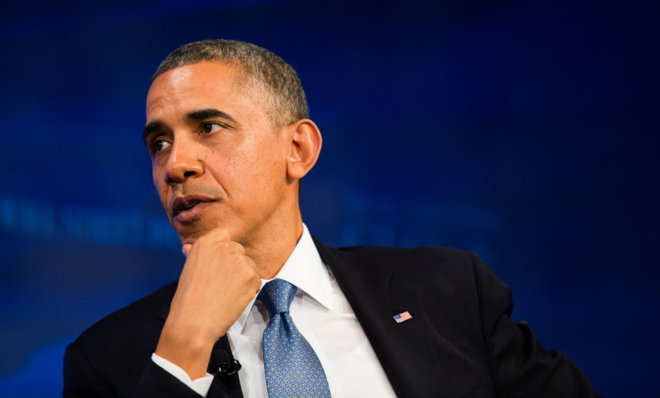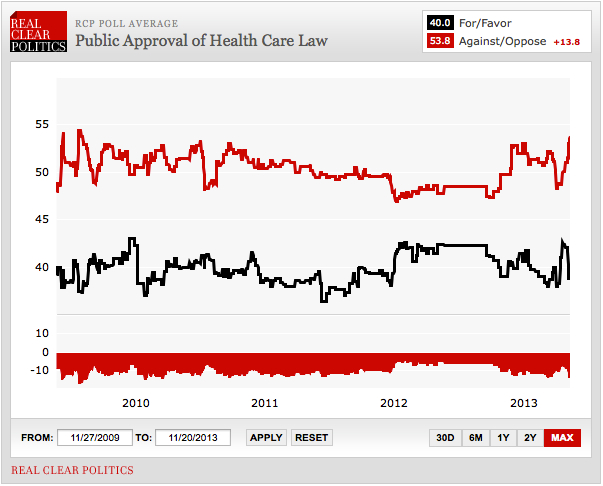Is ObamaCare actually too conservative for Americans?
Americans love their Medicare and like most components of ObamaCare. Did the president veer too far to the right in his signature law?


A free daily email with the biggest news stories of the day – and the best features from TheWeek.com
You are now subscribed
Your newsletter sign-up was successful
Perhaps things are starting to turn around for Healthcare.gov, the federal online marketplace for insurance plans set up under ObamaCare.
Yes, a significant chunk of the backend of the website hasn't even been built yet — the parts that send payments and federal subsidies to insurers will roll out in the next month or so, hopefully, according to the Health and Human Services Department — but things are steadily improving on the part of the website consumers use.
And enrollment numbers are rising, even exceeding targets in some states where the state-run websites are working reasonably well — states invariably "controlled by Democrats who are pushing the new reform," notes The New Yorker's John Cassidy. "In places where Americans know about the comprehensive and heavily subsidized health coverage available under the Affordable Care Act and can easily access it, they are doing so in substantial numbers."
The Week
Escape your echo chamber. Get the facts behind the news, plus analysis from multiple perspectives.

Sign up for The Week's Free Newsletters
From our morning news briefing to a weekly Good News Newsletter, get the best of The Week delivered directly to your inbox.
From our morning news briefing to a weekly Good News Newsletter, get the best of The Week delivered directly to your inbox.
But while ObamaCare's polling numbers haven't collapsed under the weight of the botched Healthcare.gov rollout, or even dropped more than a few points, the law is still pretty unpopular. A Reuters/Ipsos poll this week found 59 percent of respondents opposed to ObamaCare, while a new Washington Post/ABC News poll clocked opposition at 57 percent. Here's how that stacks up to ObamaCare's numbers since its inception, according to RealClearPolitics:

In the Washington Post poll, the part that seems to be dragging down the law is the part that has always been unpopular: The mandate that individuals buy insurance or pay a fine — nobody likes being told what to do, right? The requirement that businesses with 50 or more employees provide insurance is actually quite popular, with 58 percent in support and 40 percent opposed.
That is why the popular comparison of ObamaCare to George W. Bush's health-care reform — adding a drug benefit (Part D) to Medicare — don't quite work, says Jonathan Cohn at The New Republic. Both programs started out disastrously, and Democrats hope Obama can turn ObamaCare around as quickly as Team Bush did with Medicare Part D, which is now a firmly ensconced "part of the policy landscape." But Bush basically gave the drugs to seniors for free.
The Bush administration added the entire cost of its Medicare expansion to the deficit, Cohn says, while "Obama and his allies adopted a very different approach." They vowed that ObamaCare would pay for itself and even, over time, actually reduce the deficit. "Critics mocked them and, to this day, few people seem to believe them. But the official projections suggest they were good to their word." Cohn continues:
A free daily email with the biggest news stories of the day – and the best features from TheWeek.com
But fiscal responsibility is not easy. To offset the law's new spending — and, by the way, to reduce health-care spending overall — the Affordable Care Act raises revenue and cuts spending.... By taking these steps, ObamaCare's architects guaranteed they'd make some people angry. And that is the biggest difference between what Bush did and what Obama did. Medicare Part D was all gain, no pain....
The Affordable Care Act, by contrast, has gain and pain.... The political backlash Obama and his allies are facing, evident in a series of new polls, has a lot to do with poor implementation.... But some of the backlash is a product of the policy's trade-offs — trade-offs that ObamaCare's architects embraced because, unlike their predecessors, they happened to take fiscal responsibility seriously. [New Republic]
Frustrated liberals will tell you that, despite the headline poll numbers, a significant chunk of the opposition to ObamaCare is from people who think it doesn't go far enough. Medicare itself, after all, is so popular that only the brave or foolhardy politician suggests even trimming it back. Plenty of people, especially on the Left, are miffed that ObamaCare doesn't include the "public option" to enroll in government health care, especially if private insurers don't step up.
The Washington Post's Ezra Klein has explained that this was a conscious decision by Obama and congressional Democrats, based on what they believed were the lessons from Bill Clinton's failed health-care overhaul in 1994: People are afraid of losing their health care, and ObamaCare was designed as the least disruptive way to reform America's entrenched health insurance system. The vast majority of people will keep their health insurance plans, whether they like them or not.
The problem conservative critics of ObamaCare have to contend with, says Andrew Sullivan at The Dish, is that the "U.S. pays far more and gets far less in health care than any other comparable country," especially those like Britain and Sweden with socialized medicine. The Affordable Care Act isn't perfect, he adds, but it's at least "a good faith attempt at integrating the existing structures of American health care into a better system that can expand coverage and also control costs."
In that sense, once again, I think Obama is the conservative in this — and many ideological liberals will not disagree. It may be that this conservative compromise won't work; but a more bare-bones insurance regime which does not have to include the basic needs of most lives, and skimps on preventative care, is a false economy. [The Dish]
"I'd add some more conservative ingredients to the mix," Sullivan adds, but "if you want a free market in health care, you have to let people die on the streets or in agony at home rather than seeking mandatory help in an emergency room, if they have not been able to buy insurance."
Anything else is socialized medicine, which we've had in America since 1986. The question is simply whether we want to have the most f—ed-up, inefficient, and inhumane socialized system on the planet or whether we have the political courage to tackle this. Decry Obama all you like, but he has tackled this. And the pile-on is a form of denial that we have a problem. [The Dish]
Peter has worked as a news and culture writer and editor at The Week since the site's launch in 2008. He covers politics, world affairs, religion and cultural currents. His journalism career began as a copy editor at a financial newswire and has included editorial positions at The New York Times Magazine, Facts on File, and Oregon State University.
-
 How the FCC’s ‘equal time’ rule works
How the FCC’s ‘equal time’ rule worksIn the Spotlight The law is at the heart of the Colbert-CBS conflict
-
 What is the endgame in the DHS shutdown?
What is the endgame in the DHS shutdown?Today’s Big Question Democrats want to rein in ICE’s immigration crackdown
-
 ‘Poor time management isn’t just an inconvenience’
‘Poor time management isn’t just an inconvenience’Instant Opinion Opinion, comment and editorials of the day
-
 The billionaires’ wealth tax: a catastrophe for California?
The billionaires’ wealth tax: a catastrophe for California?Talking Point Peter Thiel and Larry Page preparing to change state residency
-
 Bari Weiss’ ‘60 Minutes’ scandal is about more than one report
Bari Weiss’ ‘60 Minutes’ scandal is about more than one reportIN THE SPOTLIGHT By blocking an approved segment on a controversial prison holding US deportees in El Salvador, the editor-in-chief of CBS News has become the main story
-
 Has Zohran Mamdani shown the Democrats how to win again?
Has Zohran Mamdani shown the Democrats how to win again?Today’s Big Question New York City mayoral election touted as victory for left-wing populists but moderate centrist wins elsewhere present more complex path for Democratic Party
-
 Millions turn out for anti-Trump ‘No Kings’ rallies
Millions turn out for anti-Trump ‘No Kings’ ralliesSpeed Read An estimated 7 million people participated, 2 million more than at the first ‘No Kings’ protest in June
-
 Ghislaine Maxwell: angling for a Trump pardon
Ghislaine Maxwell: angling for a Trump pardonTalking Point Convicted sex trafficker's testimony could shed new light on president's links to Jeffrey Epstein
-
 The last words and final moments of 40 presidents
The last words and final moments of 40 presidentsThe Explainer Some are eloquent quotes worthy of the holders of the highest office in the nation, and others... aren't
-
 The JFK files: the truth at last?
The JFK files: the truth at last?In The Spotlight More than 64,000 previously classified documents relating the 1963 assassination of John F. Kennedy have been released by the Trump administration
-
 'Seriously, not literally': how should the world take Donald Trump?
'Seriously, not literally': how should the world take Donald Trump?Today's big question White House rhetoric and reality look likely to become increasingly blurred
